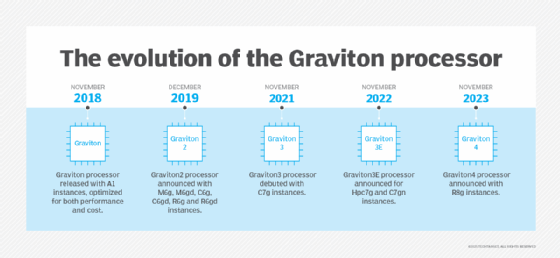
An introduction to AWS Graviton processors and instances
With improved performance in each generation, AWS Graviton processors reduce energy use and cost, making them ideal for many workloads. But which instance type should you choose?
When choosing the right cloud instance, enterprises often want the best performance at a lower cost.
Amazon EC2 offers a wide range of instance families and types that can run on demand with reliability and without investment into costly on-premises hardware. However, choosing the wrong instance can be quite costly, even if the performance is on point. Luckily, instances powered by AWS Graviton processors promise performance and affordability.
Learn more about the basics of Graviton processors, their corresponding instance families and how to select the right instance type.
The evolution of AWS Graviton processors
Graviton processors are designed to deliver more efficient compute capabilities in terms of power consumption, parallel processing and overall cost.
AWS unveiled the first generation of its custom-built Graviton processors in 2018. These processors powered the cloud provider's general-purpose A1 EC2 instances. Graviton2 was announced in 2020 and Graviton3 in 2021. Graviton4 was announced in late 2023, but it was made generally available in July 2024. Current AWS Graviton processors are based on 64-bit Arm Neoverse cores, and unlike commercially available processors from Intel, AMD and Nvidia, they are Arm-based and custom-built by AWS.

Each generation of Graviton processor introduces improvements compared to the previous generation. According to AWS, Graviton3 delivers 25% better performance and 50% faster memory access compared to Graviton2, as well as 60% lower energy consumption. Graviton4 delivers up to 30% better compute performance compared to Graviton3.
Explore AWS Graviton-based instances
The more recent Graviton-powered processors support a wider range of instance options. These range from general-purpose to instances optimized for memory-, storage- or compute-intensive workloads. The processors provide developers with more flexibility to choose more combinations of virtual CPU (vCPU) and memory.
Here is a quick list of the AWS Graviton-based instances and the processor that powers each:
- AWS Graviton2. C6g, C6gn, C6gd, M6g, M6gd, T4g, Im4gn, I4g, Is4gen, X2gd, G5g, R6g and R6gd.
- AWS Graviton3/3E. C7g, C7gn, C7gd, HPC7g, M7g, M7gd, R7g and R7gd.
- AWS Graviton4. M8g, I8g, R8g, C8g and X8g.
Graviton-based instances are available in a range of AWS services, including Elastic Kubernetes Service, MemoryDB, GameLift, Managed Streaming for Apache Kafka, EMR, CodeBuild, SageMaker, Relational Database Service and OpenSearch Service. Keep in mind that the supported Graviton generations vary by service and selected instance family.
Performance is expected to be higher than previous-generation instances, so IT teams supporting large clusters might be able to achieve the same level of customer experience with fewer servers, which can be more cost-effective. Application owners should evaluate the right cost-and-performance balance when selecting Graviton processors.
Cost savings
Regarding AWS compute usage cost, Graviton-powered instances, in some cases, have a cost rate 25% lower compared to equivalent non-Graviton instances with similar vCPU and memory specifications. For example, a non-Graviton m5.large instance rate is approximately 25% higher compared to a Graviton m6g.large instance.
As Graviton evolves, these price differences are likely to be even higher. This is without considering any potential performance improvements that could result in a lower number of deployed compute instances or a smaller instance size compared to their non-Graviton counterparts.
Select the right Graviton instance type
To choose the right AWS Graviton instance type, consider their unique capabilities, and then map those capabilities to workload requirements.
The different categories of instance types powered by AWS Graviton include the following:
- General purpose. Some applications require a balanced distribution of compute, network and memory resources. These apps are typically a good fit for general-purpose M8g instances.
- Memory-optimized. These are well suited to data analysis software and database engines or other applications that use significant in-memory caching.
- Compute-optimized. These are best for compute-intensive applications, such as web servers, gaming, content processing and machine learning (ML).
- Storage-optimized. These are recommended for applications that require high throughput and performance when saving or retrieving data from local disk storage, such as databases, streaming and data analytics tools.
- Accelerated computing. These are optimal for ML inference tasks and graphic computing, such as game streaming on mobile devices.
- High performance computing-optimized. These are ideal for compute-intensive applications, such as computational fluid dynamics, weather forecasting, simulations and molecular dynamics.
Even though it is recommended to use the latest version of Graviton, there are some situations, such as with storage optimization or accelerated computing, where only a previous generation of processor powers these instance types. Also, not all Graviton instance types are available in all AWS Regions. Given AWS' constant release of new platforms and features, this is likely to change on a regular basis.
However, before you jump in, you need to make sure what your applications needs are and if the instance type you choose is compatible.
Assess what your app needs
Execute load tests to evaluate an application's specific needs for compute, memory, storage and networking, and identify the right mix of resources. Evaluating CloudWatch metrics in all these areas is critical, along with response times and other performance metrics, to determine the right instance family and size.
When reviewing load test results, calculate the expected AWS cost of the selected configuration to ensure the right mix of performance and cost is deployed in a production environment. Even though there are high-level guidelines related to the recommended instance type category for some applications, load tests are essential to determine the right instance type for a specific application and usage patterns.
Test for incompatibilities
Since Graviton supports the full range of EC2 instance type categories, it is available for virtually any type of workload that regular EC2 instances have performed pre-Graviton. However, before migrating to the latest generation of Graviton instances, perform thorough functional tests for each application, and make sure there are no OS, library or agent incompatibilities.
Graviton processors are compatible with existing OSes available in EC2 Amazon Machine Images, including Amazon Linux 2023, Amazon Linux 2, Red Hat Enterprise Linux, Ubuntu, Ubuntu Pro, CentOS, Debian and SUSE, but Graviton EC2 instances do not support Windows as an OS or components written on x86 architecture.
Editor's note: This article was updated to include information on the third and fourth generation of Graviton processors.
Ernesto Marquez is owner and project director at Concurrency Labs, where he helps startups launch and grow their applications on AWS. He enjoys building serverless architectures, building data analytics solutions, implementing automation and helping customers cut their AWS costs.








